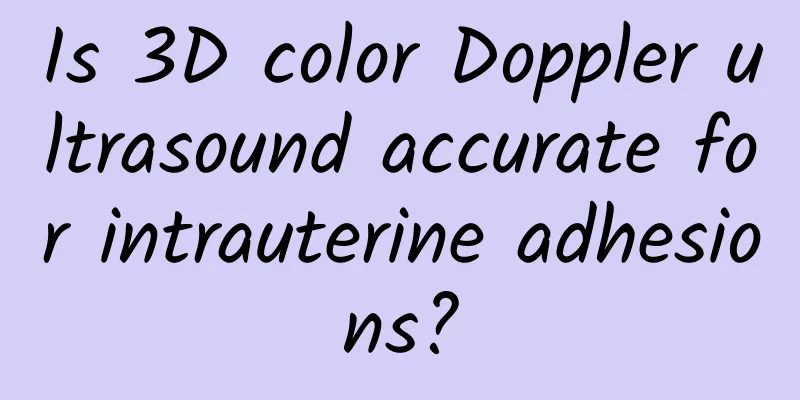Is 3D color Doppler ultrasound accurate for intrauterine adhesions?

|
Three-dimensional color Doppler ultrasound has a certain degree of accuracy in detecting intrauterine adhesions, but not all cases can be detected. Even if the results are normal, the possibility of intrauterine adhesions cannot be completely ruled out. 1. Causes of intrauterine adhesions If women do not pay attention to hygiene or resume sexual life too early after a miscarriage or uterine curettage, it may cause uterine adhesions. Multiple miscarriages or uterine curettages are also risk factors. If menstruation has not occurred for more than 40 days after miscarriage, a 3D color Doppler ultrasound examination is recommended. This examination can help observe whether there are adhesions or residues in the uterine cavity. If residues are found, it is very important to perform uterine curettage treatment in a timely manner. 2. Potential impact of infertility Intrauterine adhesions may lead to infertility, which is an important consideration for women planning pregnancy. If intrauterine adhesions are suspected, a three-dimensional vaginal ultrasound is recommended during menstruation. Compared with ordinary examinations, vaginal ultrasound provides more direct and accurate information. If intrauterine adhesions are confirmed, hysteroscopic surgery can be performed within 3 to 7 days after the end of menstruation. 3. Preventive measures and health advice The key to preventing intrauterine adhesions is to maintain good personal hygiene habits, especially in terms of sexual life. If you do not plan to get pregnant, be sure to take contraceptive measures to avoid the harm caused by multiple miscarriages. Regular gynecological examinations are also an important step to ensure reproductive health. 4. Limitations of 3D Color Doppler Ultrasound Although 3D color Doppler ultrasound has its advantages in detecting intrauterine adhesions, it cannot completely replace other means of examination. If the 3D color Doppler ultrasound results are normal but the symptoms persist, the doctor may recommend further examinations, such as hysteroscopy, to obtain more detailed information. 5. Personal experience and suggestions When facing possible intrauterine adhesions, it is important to maintain a positive attitude and good communication. Discuss all possible examinations and treatment options with your doctor and choose the path that suits you best. At the same time, pay attention to changes and signals in your body and seek professional help in a timely manner. Through the above information, I hope to help you better understand the role of 3D color Doppler ultrasound in the detection of intrauterine adhesions and how to take preventive measures in daily life. Maintaining a healthy lifestyle and regular check-ups are key to ensuring reproductive health. |
<<: What to eat after menopause to delay aging
>>: Does a 5.5 cm uterine fibroid require surgery?
Recommend
The best treatment for uterine fibroids How to treat uterine fibroids
Uterine fibroids are a benign tumor that not only...
Expert introduction: Is frequent abdominal pain due to adnexitis?
Is frequent abdominal pain due to adnexitis? In f...
Can I eat spicy food during my period? No
Women should not eat spicy food during their mens...
Can patients with bacterial vaginosis exercise?
Women's private parts are very prone to breed...
What should I do if I have pelvic effusion caused by inflammation?
What should I do if I have pelvic effusion caused...
What is the best medicine for uterine effusion?
There are two types of uterine effusion: physiolo...
How much does uterine fibroid surgery cost?
Uterine fibroids are a common gynecological disea...
Brown discharge after 10 days of abortion
It may be normal to have brown discharge 10 days ...
What are the essential drugs for treating hyperprolactinemia?
Hyperprolactinemia is also known as hyperprolacti...
Is cervical hypertrophy a precancerous lesion of the cervix?
Cervical hypertrophy is not equivalent to cervica...
Can I get pregnant with polycystic ovaries?
We know that the ovaries are responsible for ovul...
The causes of different types of uterine fibroids. Can uterine fibroids cause irregular bleeding?
There are many types of uterine fibroids, and for...
Can women get pregnant if they have cervical warts?
Cervical warts are showing a trend of younger age...
A brief discussion on the three main methods of treating ectopic pregnancy
In real life, ectopic pregnancy is not a rare gyn...
How long after curettage can I have sex? The harm of having sex too early after curettage
For most female friends, they have certain gyneco...









